Difference between revisions of "Help pages for SOCR Cartography"
m (→How to use the Cartography Morphing Utility) |
|||
| (4 intermediate revisions by one other user not shown) | |||
| Line 11: | Line 11: | ||
<center>[[Image:SOCR_Cartography_Fig1.png|500px]]</center> | <center>[[Image:SOCR_Cartography_Fig1.png|500px]]</center> | ||
| − | Click "Data" tab, bring the data table to the front view, the first 2 columns | + | Click "Data" tab, bring the data table to the front view, the first '''2 columns must be the X and Y coordinates''' of the data in space. Loading Data requires the data to be in ASCII format using tab, comma or space separators between values. |
<center>[[File:Cartography_data.jpg|500px]]</center> | <center>[[File:Cartography_data.jpg|500px]]</center> | ||
| Line 27: | Line 27: | ||
== How to use the Cartography Morphing Utility== | == How to use the Cartography Morphing Utility== | ||
| − | The following protocol demonstrates how to generated a new cartography map by morphing the GIS geometry based on some of the variables contained in the data. These variables must have quantitative values for each of the regions (simple closed polygons) representing the GIS geometric map. | + | The following protocol demonstrates how to generated a new cartography map by morphing ((spatial transformation of) the GIS geometry based on some of the variables contained in the data. These variables must have quantitative values for each of the regions (simple closed polygons) representing the GIS geometric map. |
* Start by loading the [http://socr.ucla.edu/htmls/SOCR_Cartograhy.html SOCR Cartography applet] | * Start by loading the [http://socr.ucla.edu/htmls/SOCR_Cartograhy.html SOCR Cartography applet] | ||
* Load your data (geometry and meta-data) or just use one of the examples (e.g., click the '''Demo CA Ozone''' button on the left panel) | * Load your data (geometry and meta-data) or just use one of the examples (e.g., click the '''Demo CA Ozone''' button on the left panel) | ||
| Line 34: | Line 34: | ||
* Select the '''Cartogram Attribute''' (quantitative variable that will be used to morph the map) - e.g., choose ''PERIMETER'' | * Select the '''Cartogram Attribute''' (quantitative variable that will be used to morph the map) - e.g., choose ''PERIMETER'' | ||
* Click the '''Next''' button twice | * Click the '''Next''' button twice | ||
| − | * Finally, | + | * Finally, click the '''Compute''' button |
* It may take 1-5 minutes to compute the morph on the map grid. When it finishes, it will generate a new Layer on your Graph tab where the maps are displayed. You can toggle on/off layers to display desired features as shown on the images below. | * It may take 1-5 minutes to compute the morph on the map grid. When it finishes, it will generate a new Layer on your Graph tab where the maps are displayed. You can toggle on/off layers to display desired features as shown on the images below. | ||
| Line 45: | Line 45: | ||
* [[SOCR_Data | SOCR Datasets]] | * [[SOCR_Data | SOCR Datasets]] | ||
* [http://socr.ucla.edu/htmls/SOCR_Cartograhy.html SOCR Cartography and Spatial Statistics Applet] | * [http://socr.ucla.edu/htmls/SOCR_Cartograhy.html SOCR Cartography and Spatial Statistics Applet] | ||
| + | * [[SOCR_Cartography_Project|SOCR Cartography Project Page]] | ||
| − | {{translate|pageName=http://wiki. | + | {{translate|pageName=http://wiki.socr.umich.edu/index.php?title=Help_pages_for_SOCR_Cartography}} |
Latest revision as of 06:49, 5 March 2014
Contents
SOCR Help Pages - SOCR Cartography and Spatial Statistics
Introduction
The SOCR Cartography and Spatial Statistics Applet provides an interactive and dynamic visualization of spatial, cartographic and GIS data.
How to use the SOCR Motion Charts?
After the applet is loaded, click on one of the demo buttons (here we use the "Demo US Election" as example). A set of shape file will be loaded and drawn as background map, a data file is also loaded. Then the "Graph" tab will be bring to the front, a map of US will be shown in green and one set of data is shown as black square. Move mouse over the map slowly, info about the county or the data will popup.
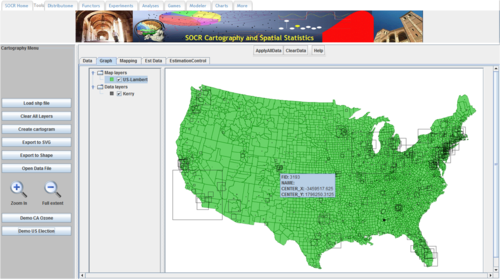
Click "Data" tab, bring the data table to the front view, the first 2 columns must be the X and Y coordinates of the data in space. Loading Data requires the data to be in ASCII format using tab, comma or space separators between values.
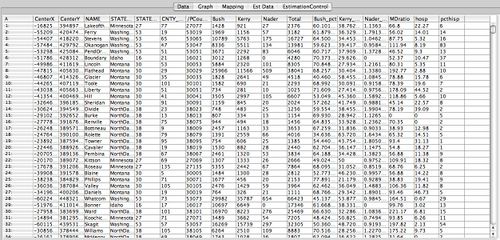
Click "Mapping" tab, all columns in the data table will be listed for mapping except the first 2 columns. The default drawing format is "Black_square", click "Apply This Layer" will put this column of data on the map, you can also choose the "ApplyAllData" button from the top toolbar to draw all data columns. For more color/shape/shadow choice, you can click on the "Color" pull down list to see other options: Color_palette(for single color choice), or Color_Theming(color coded for value).
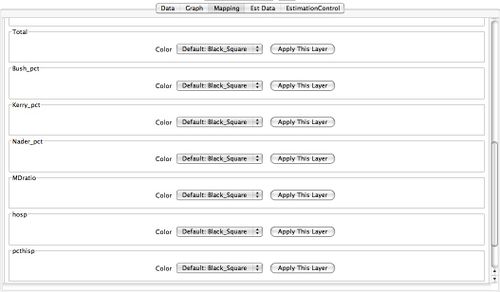
When color_palette is chosen, a popup window will be visible, you can choose color by click on the color squares, and choose "Attribute"(Raw, Normalized, Quartite, Threshold), "Shape"(Square, Triangle,Circle), "Shadow"(on/off), also a text box for you to enter the threshold value.
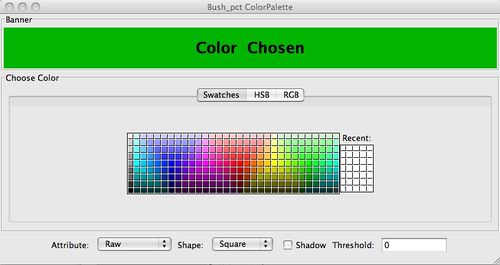
When color_theming is chosen, a popup window will be visible, check "Enable color theming" first to make your choice visible. You can choose "Attribute"(Raw, Normalized, Quartite, Threshold), "Shape"(Square, Triangle,Circle), "Shadow"(on/off), also a text box for you to enter the threshold value.
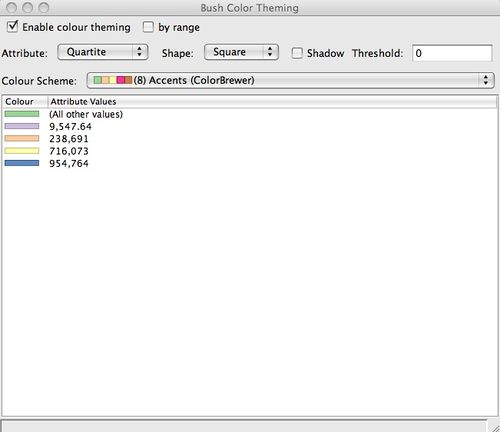
How to use the Cartography Morphing Utility
The following protocol demonstrates how to generated a new cartography map by morphing ((spatial transformation of) the GIS geometry based on some of the variables contained in the data. These variables must have quantitative values for each of the regions (simple closed polygons) representing the GIS geometric map.
- Start by loading the SOCR Cartography applet
- Load your data (geometry and meta-data) or just use one of the examples (e.g., click the Demo CA Ozone button on the left panel)
- Click the Create Cartogram button on the left panel
- Click the Next button twice on the Cartogram Creation Wizard (ScapeToad) window that pops out
- Select the Cartogram Attribute (quantitative variable that will be used to morph the map) - e.g., choose PERIMETER
- Click the Next button twice
- Finally, click the Compute button
- It may take 1-5 minutes to compute the morph on the map grid. When it finishes, it will generate a new Layer on your Graph tab where the maps are displayed. You can toggle on/off layers to display desired features as shown on the images below.
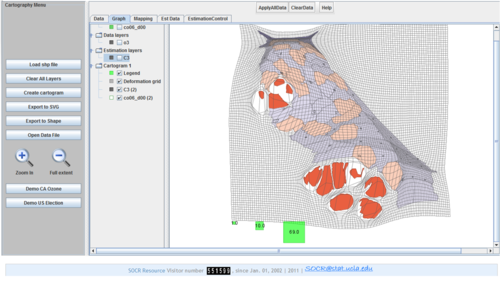
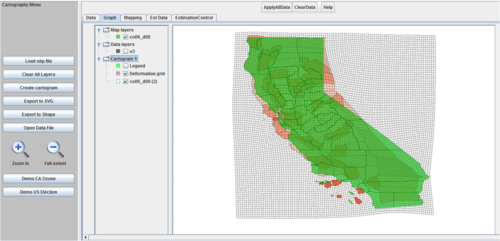
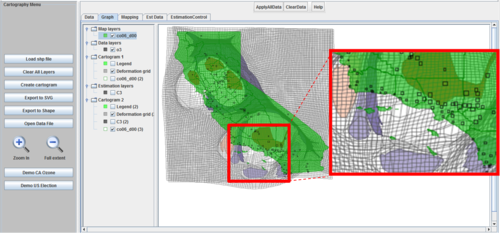
See also
- About_pages_for_SOCR_Motion_Charts
- SOCR Datasets
- SOCR Cartography and Spatial Statistics Applet
- SOCR Cartography Project Page
Translate this page:
